

Neil Gaiman: Why our future depends on libraries, reading and daydreaming. It’s important for people to tell you what side they are on and why, and whether they might be biased.

A declaration of members’ interests, of a sort. So, I am going to be talking to you about reading. I’m going to tell you that libraries are important. I’m going to suggest that reading fiction, that reading for pleasure, is one of the most important things one can do. I’m going to make an impassioned plea for people to understand what libraries and librarians are, and to preserve both of these things. How Reading Rewires Your Brain for More Intelligence and Empathy. Fitness headlines promise staggering physical results: a firmer butt, ripped abs, bulging biceps.
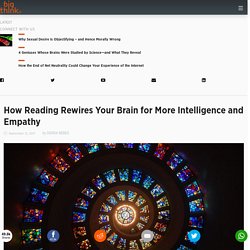
Nutritional breakthroughs are similar clickbait, with attention-grabbing, if often inauthentic—what, really, is a “superfood?” —means of achieving better health. Strangely, one topic usually escaping discussion has been shown, time and again, to make us healthier, smarter, and more empathic animals: reading. Reading, of course, requires patience, diligence, and determination. Scanning headlines and retweeting quips is not going to make much cognitive difference. The benefits are plenty, which is especially important in a distracted, smartphone age in which one-quarter of American children don’t learn to read. White matter carries information between regions of grey matter, where any information is processed. Reading in one language has enormous benefits.
In one of the most fascinating aspects of neuroscience, language affects regions of your brain involving actions you’re reading about. Does reading fiction make you a better person? Stacks of library books.
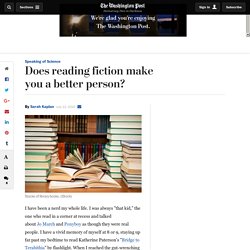
(iStock) I have been a nerd my whole life. I was always "that kid," the one who read in a corner at recess and talked about Jo March and Ponyboy as though they were real people. I have a vivid memory of myself at 8 or 9, staying up far past my bedtime to read Katherine Paterson's "Bridge to Terabithia" by flashlight. When I reached the gut-wrenching ending, I began sobbing loudly enough to summon my mother from down the hallway. As soon as she saw the book in my hand, she knew nothing was actually wrong. How Does Fiction Reading Influence Empathy? An Experimental Investigation on the Role of Emotional Transportation. Citation: Bal PM, Veltkamp M (2013) How Does Fiction Reading Influence Empathy?
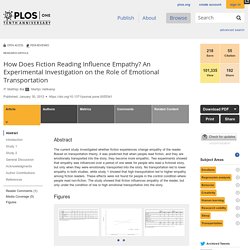
An Experimental Investigation on the Role of Emotional Transportation. PLoS ONE8(1): e55341. Editor: Liane Young, Boston College, United States of America Received: September 4, 2012; Accepted: December 21, 2012; Published: January 30, 2013 Copyright: © 2013 Bal, Veltkamp. Funding: No current external funding sources for this study. Competing interests: Martijn Veltkamp is employed by FrieslandCampina. Introduction. Novel Finding: Reading Literary Fiction Improves Empathy. How important is reading fiction in socializing school children?
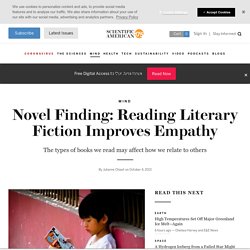
Researchers at The New School in New York City have found evidence that literary fiction improves a reader’s capacity to understand what others are thinking and feeling. Emanuele Castano, a social psychologist, along with PhD candidate David Kidd conducted five studies in which they divided a varying number of participants (ranging from 86 to 356) and gave them different reading assignments: excerpts from genre (or popular) fiction, literary fiction, nonfiction or nothing. After they finished the excerpts the participants took a test that measured their ability to infer and understand other people’s thoughts and emotions.
The researchers found, to their surprise, a significant difference between the literary- and genre-fiction readers. Your Brain on Books: 10 Ways Reading Affects Psyche. Click above to view full image!

Any book lover can tell you: diving into a great novel is an immersive experience that can make your brain come alive with imagery and emotions and even turn on your senses. It sounds romantic, but there’s real, hard evidence that supports these things happening to your brain when you read books. In reading, we can actually physically change our brain structure, become more empathetic, and even trick our brains into thinking we’ve experienced what we’ve only read in novels.We make photos in our minds, even without being prompted:Reading books and other materials with vivid imagery is not only fun, it also allows us to create worlds in our own minds.
But did you know that this happens even if you don’t mean it to? Researchers have found that visual imagery is simply automatic. How Good Books Can Change You. Ever read a book that's changed your life?

You're not imagining it -- the process of digesting a character or a series of events actually turns you into a different person. Summer's here and time for summer reading at the beach, in a hammock or on the porch. Books are great for passing the time on lazy summer afternoons. And according to Ohio State researchers, the books you read from childhood on can also change who you are. They do this by a process the researchers called experience taking. Psychologists Discover How People Subconsciously Become Their Favorite Fictional Characters.
Psychologists have discovered that while reading a book or story, people are prone to subconsciously adopt their behavior, thoughts, beliefs and internal responses to that of fictional characters as if they were their own.
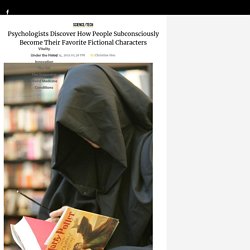
Experts have dubbed this subconscious phenomenon ‘experience-taking,’ where people actually change their own behaviors and thoughts to match those of a fictional character that they can identify with. Researcher from the Ohio State University conducted a series of six different experiments on about 500 participants, reporting in the Journal of Personality and Social Psychology, found that in the right situations, ‘experience-taking,’ may lead to temporary real world changes in the lives of readers.
They found that stories written in the first-person can temporarily transform the way readers view the world, themselves and other social groups. "Experience-taking is much more immersive -- you've replaced yourself with the other," Libby said in a statement. Can a fictional character take you over? Good lord above!
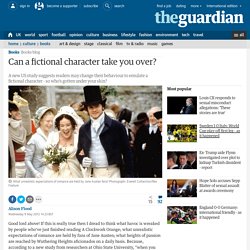
If this is really true then I dread to think what havoc is wreaked by people who've just finished reading A Clockwork Orange; what unrealistic expectations of romance are held by fans of Jane Austen; what heights of passion are reached by Wuthering Heights aficionados on a daily basis. Because, according to a new study from researchers at Ohio State University, "when you 'lose yourself' inside the world of a fictional character while reading a story, you may actually end up changing your own behaviour and thoughts to match that of the character".
Just published in the Journal of Personality and Social Psychology, the study gave undergraduates various stories to read and observed their reactions.